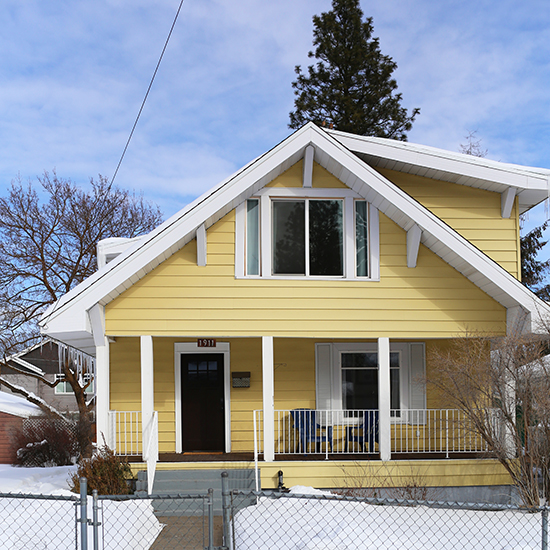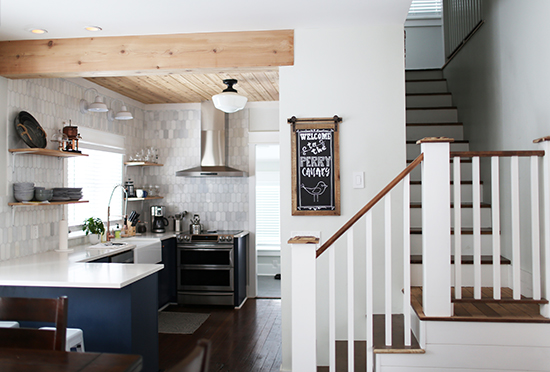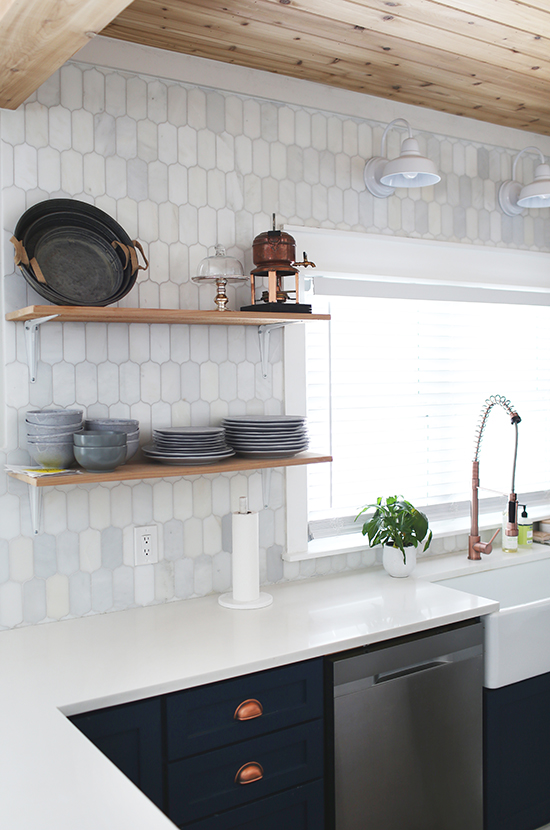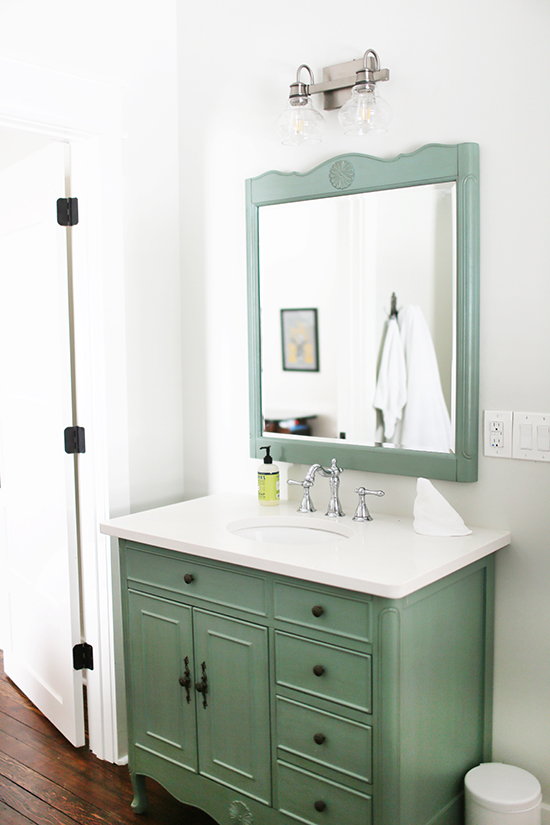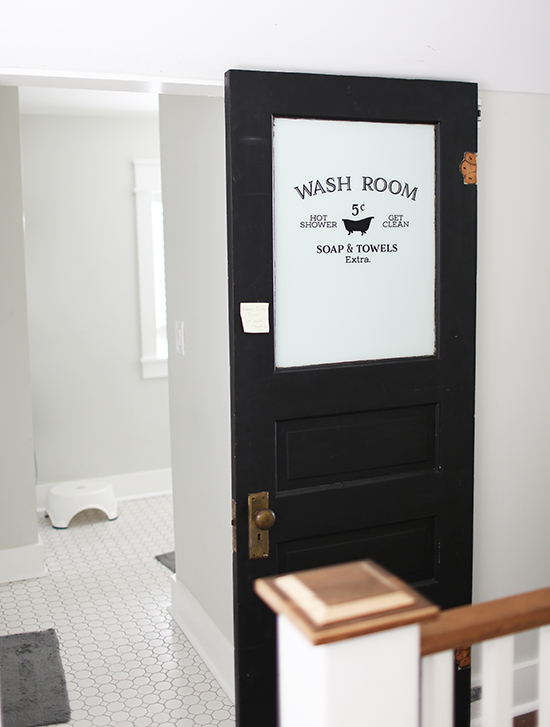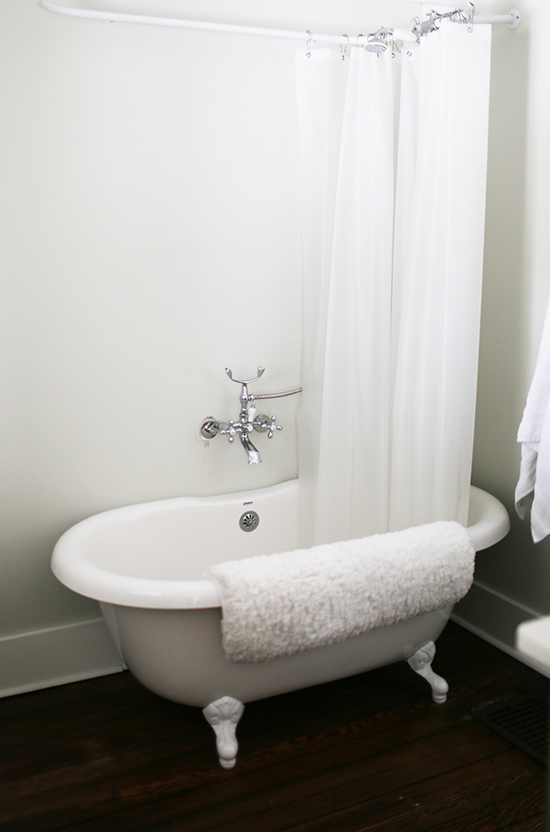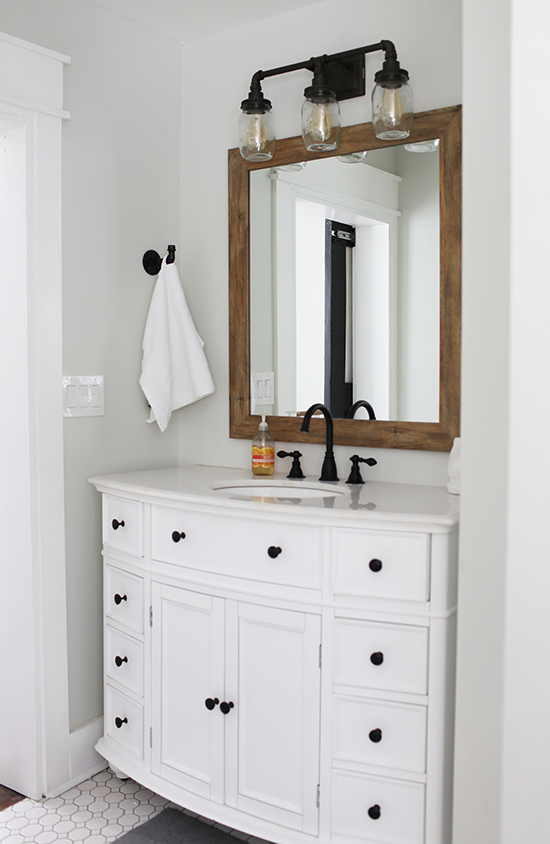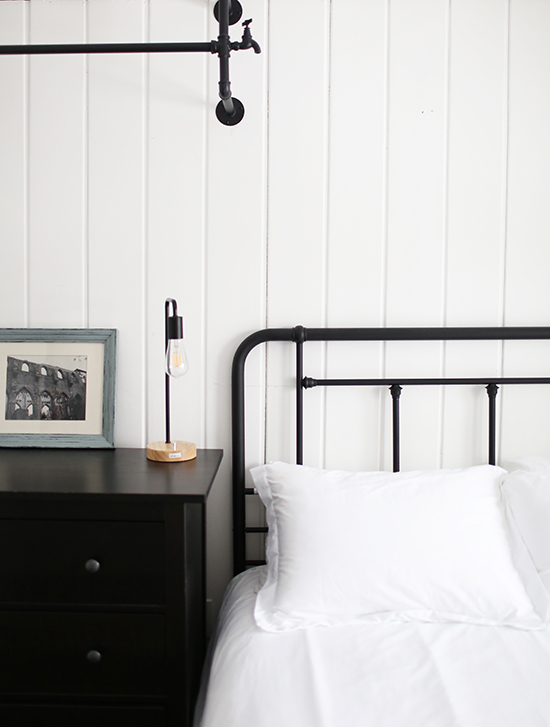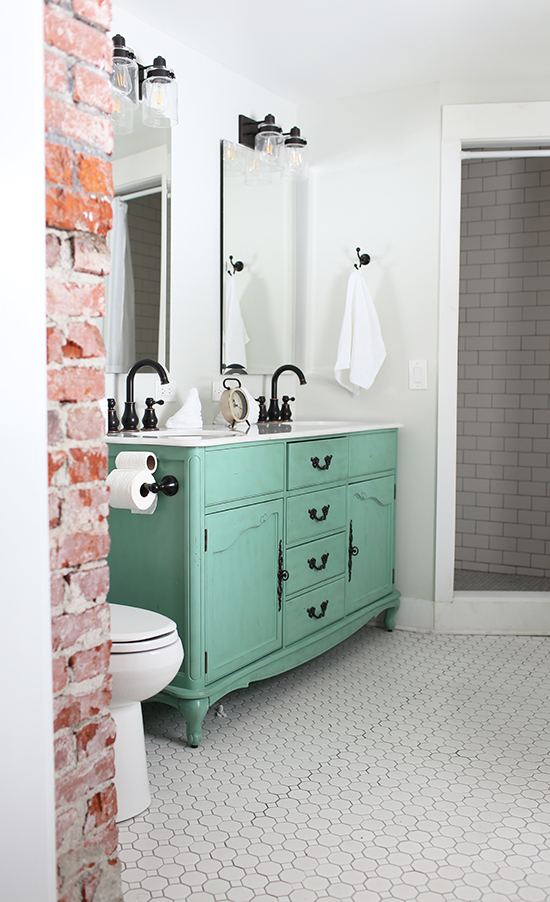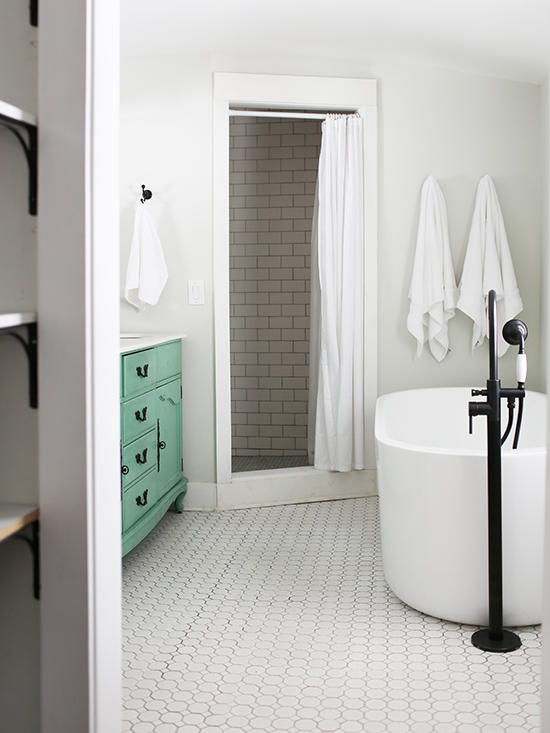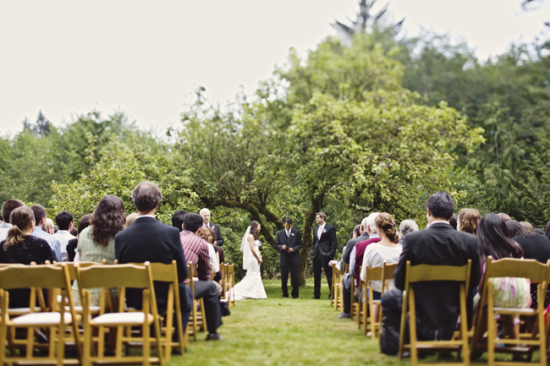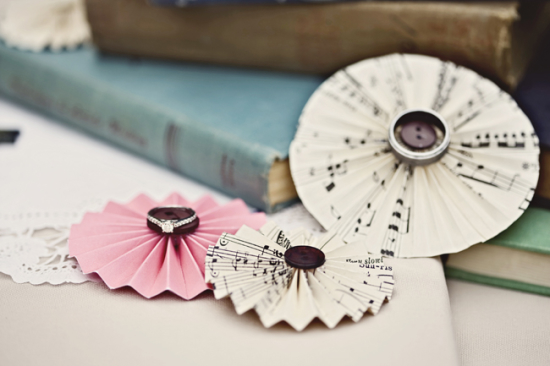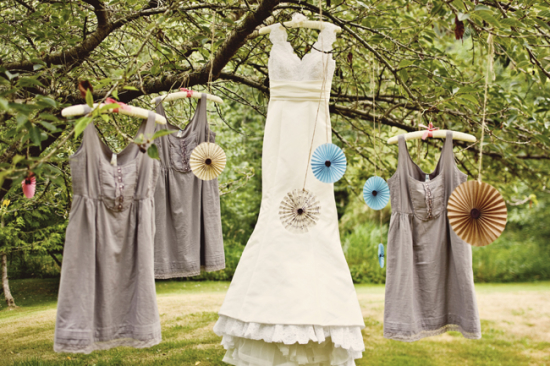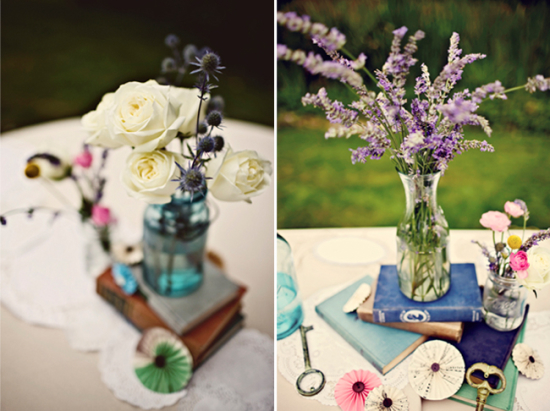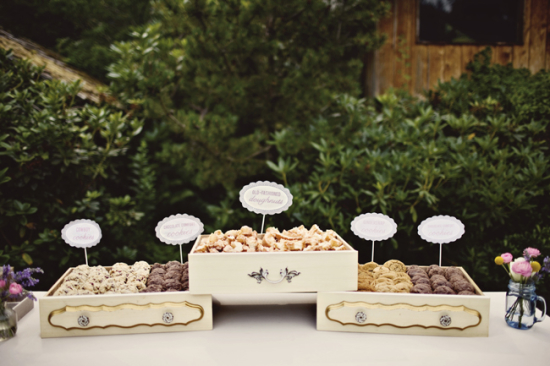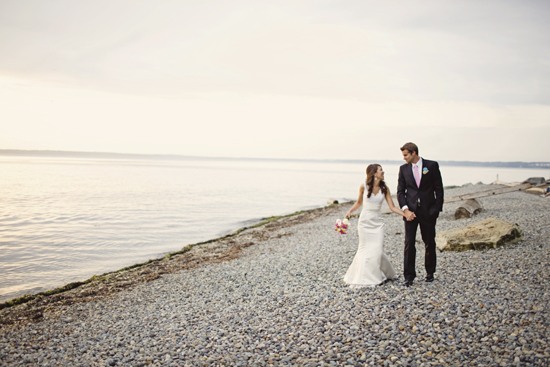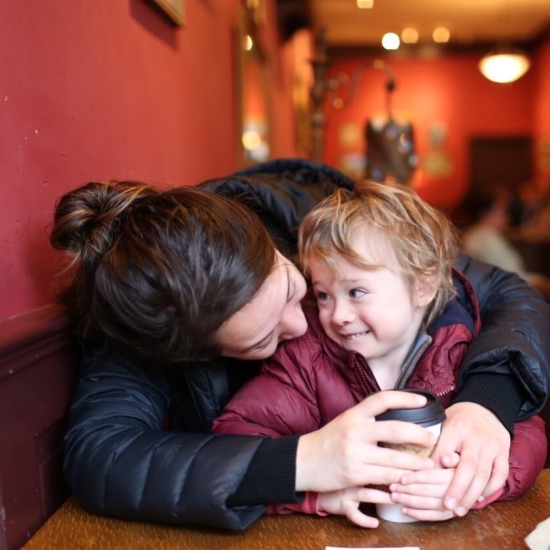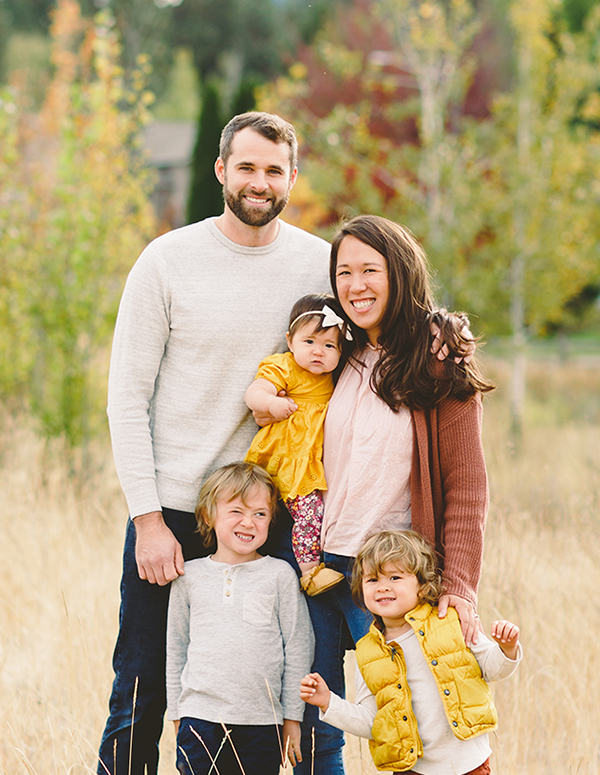22
When I started Inside Spokane, I looked on Airbnb for cool houses in my city that I could feature. "The Perry Canary" instantly caught my eye. A cheery yellow Craftsman in Spokane's Perry District, it was recently renovated with lots of love and attention to detail. The owners preserved the original character as much as possible, painted the walls a bright white, and added colorful decor that makes it feel special and inviting. I especially love the bathrooms and kitchen, which incorporate modern amenities with old-fashioned charm, like a claw foot tub, ceramic hex tile, and painted dressers turned into bathroom vanities. I went over to take a few photos last month, and I asked the owners for the backstory behind the house, and how they ended up renting it on Airbnb.
1. How did you end up in Spokane?
We moved to Spokane from Seattle on February 1, 2018 with full intentions of settling down there. We had purchased the home in December 2017 and started renovations, but when it became clear it was going to take MUCH longer than we expected, we decided to move to Spokane and live out of Airbnbs until the house was livable. After two Airbnbs and a week with a neighbor we barely knew, we moved in...but honestly, we shouldn't have. It was basically glamping for a while. We didn't have a toilet until 5pm the day we moved in, and didn't have a shower until 2pm the next day. We didn't have kitchen countertops or the kitchen sink or a washer and dryer until a week later. You get the picture :)
2. Tell me a little about the house!
It was built in 1907! We uncovered a lot of cool things during all the demo: pictures and postcards from 1906, newspapers from the 1940's, coins from the 1800's, etc. We also found the brick that we left exposed going up the staircase that was part of the kitchen- must have been some sort of brick oven. The man that lived there before us lived there for 65 years (until he died). He bought the extra lot next door 40 years ago and planted a garden and tons of flowers- last spring and summer we were continually surprised by the flowers that popped up. I've heard this house was the place they always had extended family gatherings. He and his wife raised their 5 children there. He became a widower 20ish years before he died, and maintained the dozen rose bushes as a way to maintain his wife's memory (her middle name was Rose). Also, the neighbors next to the extra lot has lived there for almost 50 years!
3. What's your favorite thing about the house?
My favorite room is the kitchen. If you could have seen it before you would really appreciate it now! I also really love all of the brick we uncovered and exposed!
4. What improvements did you make?
Oh man, we literally gutted it down to the studs, knocked down walls, opened up the staircase (it used to have a door and was super steep and vary narrow), redid the upstairs in order to add a master bath (there used to be just one bigger hall bath) and closet. I love the secret kids room that used to just be unused attic space. The upstairs and den downstairs also had dropped ceilings with the tile (like in office buildings), so we raised those up and added all new dry wall. There was wood paneling everywhere!! We tore it all down except for the 2 smaller bedrooms (but painted those white of course). We took out shag carpet that was in every room (even the bathrooms), another layer of skinny wood floors, and redid the beautiful original 1907 hardwoods. I'm sure I'm forgetting some things, but you get the picture. It was a big project that ended up taking 8 months!
4. When did you decide to rent this on Airbnb? Did that affect any of the decisions you made?
We were planning to settle down there so all the decisions were very much made with the vision that we were going to live there. Towards the end of the summer as the renovations were wrapping up (however, we still have a good bit more we wanted/still want to do), my husband and I were both honest with each other that we really missed Seattle. Then, literally days later I lost my job that I was allowing me to work remotely. I work in the software industry, so there are better job opportunities for me in Seattle. Also, my husband was traveling to Seattle two days a week for work, so in the end we decided it made sense for our hearts and our jobs to move back. However, we couldn't bring ourselves to sell the house after pouring our heart and soul into it. We also made some great friends in Spokane, so we decided to Airbnb it so that we could still come back and visit. In fact, we're going for Spring Break in a couple weeks! Also, during our first few months in Spokane I learned that there really wasn't a ton of Airbnb options while I was frantically trying to find places to stay, so I figured it would do well- and it has! We've had a ton of guests from all over the world already with lots of cool reasons for staying. We've had a family from China, a couple from New Zealand, then people from every corner of North America.
It's beautiful, isn't it? I think they did a great job with their renovations, staying true to the original character of this old house.
21
This is a collaborative post. All opinions are my own.
Ben and I are going through every category of our expenses and trying to cut them down. Transportation is a big one. Luckily, neither of us are "car people" and I think we've made pretty good decisions so far. We shared one car for a looong time, carpooling to work in Seattle and walking or taking the train whenever we could. After moving to Spokane and adding kids to the equation, we felt like we each needed a vehicle, so we bought our second car--a Prius. We got a great deal (used) and paid for it with cash. But now, Ben's Malibu (which he's had for over 12 years) is starting to break down, and once we have another baby we won't be able to fit all the car seats in the back of our Prius. So we're quickly approaching the time when we'll need to figure out our next vehicle...mini van, here we come! :D These tips are as much for myself as they are for you, to keep me in check.
1. Don't buy new
I've heard that new cars lose 10% of their value the instant you drive them off the lot, and 20% in the first year of ownership. That's a pretty hefty price tag for the privilege of being the first owner! For that reason, we always try to find a deal on a gently used vehicle. That way WE get the benefit from the value it has lost. Buying used is a big part of our frugal plan for transportation.
2. Buy from a private party instead of a dealer
Dealers add a markup to every car they sell--after all, they have to make money too. You can save big time if you find a deal from a private seller, preferably someone you know and trust. We got our Prius from my aunt and uncle, so we knew that not only were they giving us a good price, but they had also taken excellent care of the car. Neighborhood Facebook groups are also a good place to look. I feel like people in your neighborhood are less likely to try and scam you than a random person on Craigslist. Or take matters into your own hands. If you can't find a listing that matches what you need, try posting on your own social media profiles, asking friends if they know anyone who's selling a vehicle. Having a personal connection through a friend-of-a-friend increases your chances of getting a good deal.
3. Negotiate
Used cars are one of the few categories in America where negotiation is expected...and some wiggle room is built into the price. That means if you're not negotiating, you're paying too much. In order to negotiate well, you should do some research beforehand to see what the car is worth according to third party sites like Kelley Blue Book. Also look online for similar cars for sale at dealerships and private sellers to get a point of reference. A few hours of research could save you thousands of dollars! The power of negotiation applies to other things too...one big area is insurance. Call around to different companies, compare prices, and ask for discounts. We've been able to get significantly lower rates by doing this every couple years.
4. Factor in all the monthly costs
The initial purchase price isn't where it ends. In fact, your monthly transportation expenses can add up to even more over the years. Gas, parking, insurance, tax, and other maintenance costs are inevitable. When you're comparing different vehicles, it's important to look at the big picture. Don't just compare the initial price. Add in how much it will cost you to run each vehicle. A fuel-efficient hybrid may end up being a better deal than a gas-guzzling SUV. We have been happily surprised by how little we spend on gas for our Prius.
Even if you're not changing vehicles, there are ways to reduce the monthly transportation costs like insurance, gas, and parking. I mentioned negotiating or switching insurance companies to get a better deal. With gas, you can fill up at Costco or use Safeway points for a discount. And when it comes to parking, you pay a premium for the most convenient spots. But there's usually free parking somewhere nearby, if you're willing to show up early and walk the difference. We parked for free in downtown Seattle, by scoping out free spots that were within a few miles of our workplaces. We had to get up extra early, and sometimes we had to walk in the rain, but most of the time we actually enjoyed our walks to work. It gave us time to chat and get in some exercise first thing in the morning.
5. Don't drive as much
I don't mean you should never leave the house to save a few bucks. But if there's another method of transportation you could use, then consider that option. Walking or biking can not only save you money, but can also get you in better shape and allow you to spend time outdoors, especially now that spring is here! If you take public transportation, you can use that time to read a book, listen to a podcast, or catch up on emails. Redeem your commute time for something more productive than sitting in traffic getting annoyed at other drivers.
6. Consider if you can make do with one vehicle
Ben and I did this for our first seven years of marriage. We worked within walking distance of each other, so we carpooled together. If we really needed separate transportation, there was always the train, the bus, biking, getting a ride from friends, or Uber. If we needed an SUV for road trips in the snow, or a truck to move big items, we could rent one. We saved a ton of money by making this work as long as possible. Not only did we skip the car payments, but we also weren't paying insurance and gas on a second vehicle.
7. Maintain your current vehicle & make it work as long as possible
There are transactional costs like tax when you buy a vehicle. So it's usually smart to make your current car last as long as possible, especially if it still has enough seats for your family. Proper maintenance will help you get the most out of your car’s performance. Get the oil changed when it tells you to, monitor the tire pressure, and occasionally have a mechanic check it for issues. Don't wait til it's urgent. We waited too long to get our brake pads replaced, which ended up damaging our brakes as a whole. That was an expensive lesson learned.
If the reason you want to upgrade your car is because of extra features that would make driving more enjoyable, you could consider whether adding some personalized features might make you happier with your current car, instead of changing it altogether. You could add an entertainment system for kids to watch shows on long road trips, or get Private Car Number Plates to help you find a common model in a busy parking lot.
These are some of the ways we've been able to reduce our transportation costs. I'm sure I'm missing some good tips too! Any additional ideas you would add to this list?
20
My brother just got married last week, and my sister is currently engaged. So I've been thinking a lot about weddings lately. It's pretty insane how much people are expected to spend on a wedding these days, when they're usually young and not exactly rich themselves. I know some couples have parents who pay for everything, but even so...the average cost of a wedding in the U.S. is over $25,000. Twenty five thousand dollars, you guys!!! That's a downpayment on a house! What are we DOING spending that level of cash on our weddings?! In case you think that amount is inevitable, let me just say...you don't HAVE to spend that much. I certainly didn't, my brother didn't, and my sister won't either. If you can afford to spend that much, and it's truly what you want to use that money for, then ok. By all means. But if you're straight out of college and just starting your careers, if you'd have to use credit cards or borrow from family to blow $25,000 on one day...then please don't! It is possible to have a beautiful, memorable wedding that you can actually afford. It's just going to take some compromise. Here are eight practical ways to save big time.
1. The Guest List. You're getting married, it's a big deal! You're super excited and you want ALL your friends and family to share in this majorly significant day. And your coworkers at the new job you started last month. And your old friends from high school even though you hardly talk anymore. And your parents cousins who send a Christmas card every year. And your realtor. And everyone from church, of course. Before you know it, the guest list is deep into the hundreds. If the invites haven't gone out yet, this is the biggest way to save. Cut down that head count. Of course, you want to invite everyone who really is a big part of your life. But you are not obligated to include every distant relative, old friend, coworker and acquaintance. Go with your gut: do you actually want them there? will you still be friends in five years?
2. The Venue. Once you have your guest list whittled down, it should open more venue options for you. The smaller venues are often the more affordable ones. I've seen people get married at restaurants with cute decor, at public parks or gardens, or in someone's backyard. These options are usually not possible if you're guest list is scraping 300, but they're totally doable with 100 people or less. You might even be able to find someone with a large, beautiful property through social media, Airbnb, or Craigslist. They might be hesitant to host a huge crowd if they've never done weddings, but I bet they'd be willing to take a chance with a more intimate group. If you're really struggling to narrow down your guest list, another option is to plan a destination wedding in the place where you plan to take your honeymoon (you're buying tickets there anyways, right?). That way, you can invite a lot of people but rest assured that only a fraction will actually come (most likely, the ones you're truly close to). Then again, if your guest list is your priority and you want to actually have all those people celebrating alongside you, then recognize that your venue options will be limited. You can still save money by picking a less popular time of the year (or day of the week), and see if they'll give you a discount if you pay the full cost upfront instead of doing a deposit.
3. The Rings. Ladies, this is mostly directed at us since our rings tend to be the more expensive. Your engagement ring is a symbol of commitment, and you wear it every day...so I get it, you want it to be pretty. But please do not equate a bigger diamond with greater love. A simple diamond does the same job as a flashy Neil Lane Bachelor-level sparkler. In fact, I saw a study that said the pricier the ring was, the shorter the marriage lasted. Maybe it's because debt is stressful and money is one of the main things that couples fight about. So don't blow all your savings on a piece of jewelry, even if it is the most significant piece of jewelry you'll ever own!
4. The Vendors. Here's where it can reaaaally add up. The vendors. There are so many people you could hire, from a calligrapher to a wedding planner to an ice sculpture carver. But let's start with the basics. Photographer and florist. Even the most budget-conscious wedding needs those, right? Yes...probably. But you don't need to spend like crazy! One way to save is to look for someone whose style you love, but who is fairly new to the wedding industry. Ask if they'd be willing to cut you a deal in exchange for helping them to market their business and build their portfolio. I also think flowers are totally possible to DIY...with the help of some friends and internet research (that's exactly what I did). Or you can choose your favorite flowers for the bouquets, then use cheaper alternatives for the centerpieces. For example, greenery is really inexpensive and can be beautiful on its own. I love the look of a long rectangular table with a runner made of silver dollar eucalyptus, and mercury glass tealight holders sprinkled throughout. We also used a bunch of free lavender from Ben's parent's backyard. But it doesn't really matter what I did! You need to think about what YOU care about. What you've dreamed about when you imagine your wedding, what's worth it to you...and what's not. Rank your priorities, then assign your money accordingly.
5. The Dress. Take something, anything, and add the word "wedding" before it, and the price skyrockets. So instead of ordering a WEDDING cake, consider just ordering a few simple round cakes. Instead of a WEDDING dress, what about a white or ivory cocktail dress? There are beautiful options that have many of the same features as wedding dresses: lace overlays, sparkly embellishments, and long flowy skirts. You can save a huge amount of money if you're willing to do this. Same applies for your bridesmaids. I just had my girls get cute & simple dresses that they could truly rewear in the future, instead of "real" bridesmaid dresses that cost 3x the amount.
6. The Decor. I love decor. Planning all the little details of our wedding was one of the most fun parts for me. But I found ways to make it beautiful on the cheap. I folded paper pinwheels out of sheet music from Goodwill, I thrifted old books and mason jars for the centerpieces, I hand painted wooden signs on scrap wood from a torn-down fence. One of the best ways to save money is to let go of the idea that every table has to match. If you pick an overall theme, then you can hunt down vases and decor items that are similar but not exactly alike at thrift stores and discount stores, instead of having to buy everything new. Another idea is to look on Craigslist or Facebook Marketplace. You might get lucky and find another bride who is offloading everything from her wedding. If it's close enough to your style, snap those deals up! Likewise, after your wedding, recoup some of the costs by reselling items you won't use in your home. Hint: you probably don't need 25 similar vases. That reminds me, if there's something you're planning to rent that is fairly costly, look into buying it instead and reselling it after. We did that with our tablecloths. We were able to sell them for nearly as much as we paid, which meant it cost way less than renting would've.
7. The Food. Food is obviously important and necessary. You can't very well expect all these people to travel for your wedding, then feed them only a few snacks. But there are many ways to save in this category too. I've already mentioned the idea of getting some regular cakes instead of a wedding cake. You can also supplement with your favorite make-ahead desserts, like cookies or kettle corn. No need to get anything fancy and expensive like macarons or chocolate truffles. I promise people will be perfectly happy with chocolate chip cookies and m&ms. In the same vein, think about your favorite casual foods, instead of sophisticated (expensive) catered food. Burgers or tacos at a wedding might be unexpected, but most guests will think it's fun and delicious. Another idea is to get married in the morning instead of evening. That way, you can serve breakfast foods like waffles, pastries, and coffee--way less expensive than steak and cocktails. If alcohol isn't a big part of your life, consider skipping it altogether (we did, and it saved us a ton...we just had iced tea and lemonade). Or do wine and beer, and maybe one signature cocktail, instead of an open bar where people can order anything.
8. The Honeymoon. Last but not least, the honeymoon! This is such a fun, special, and memorable trip. But to be honest, a wedding itself is a LOT to plan. Adding a dream vacation on top of that? Kinda overwhelming. By the time your wedding arrives, you may be out of energy for a big, exciting trip and just want to relaaaax. You also probably won't have as much time to focus on trip planning beforehand, if all the wedding details end up taking priority. If you pick a destination like Europe which requires a lot of logistics, prior planning, and the energy to sightsee all day...you may feel like you didn't do it justice. I personally feel like it's easier (and cheaper) to take a low-key honeymoon in a destination where you won't feel guilty if you mostly just relax and enjoy being a married couple. You can always save the big, elaborate vacations for the future.
Hope this is helpful and encouraging! You can totally plan a wedding you will love and look back on fondly, without breaking the bank. All these photos are from my own wedding, which was almost nine years ago (!!!). We spent about $5000 which felt like a lot of money at the time (we were poor and newly graduated from college)...but it was way less than the national average even back then.
19
This is a collaborative post. All opinions are my own.
I've been kind of obsessed with finances lately. I shared my plan to be super frugal in 2019 so we can save up for an investment property. So far, I've tried to cut down extra expenses while simultaneously adding extra sources of income (a big one is renting our personal house on Airbnb. I'm working on a blog post all about it, so stay tuned!). I've also been listening to lots of financial podcasts to stay motivated and get ideas. But I've noticed that in these discussions, children are often referred to as one of the challenging parts of reaching our financial goals. I understand this: childcare is ridiculously expensive, and there are lots of other costs too. Everything from kids' activities, diapers, clothing, and food can add up. These costs are perhaps the first things that come to mind when we think of children in relation to money. Parenting is emotionally rewarding, but it's a big drain on the bank account. That's what the media suggests, so we assume it's true...right? Actually, I don't know! I've noticed that in our family, our kids help us stay on track with our money goals in many ways. Of course, with me as a stay-at-home mom right now, our traditional W2 income has decreased significantly. But our spending has also gotten much better since we became parents. And we've found other ways to boost our side income and get smarter about money. So maybe, having kids and saving money aren't so diametrically opposed?!
1. Kids Give Your Money Purpose
When we were earning two paychecks before, we didn't have a great purpose for the excess money. Sad to admit, we wasted a lot of it on expensive restaurants and clothes. We didn't have a unifying goal or a greater reason to save, other than vacations and a desire to buy a house eventually. Becoming parents gave our money purpose: precious little people that wholly depend on us to provide for them, feed them, and give them opportunities in life. It also motivated us to learn how to manage our money better. Parents are role models, after all, and we want to set a good example for our kids...in finances as well as all aspects of life.
2. Parents Have Different Priorities & Activities
No doubt about it, children change your priorities and the activities you do for fun. The things we did as a married couple with no kids are just not the same with little ones. Eating at fancy restaurants with babies who fling food everywhere? Not fun. Taking them to the movie theater? Not possible. And babies just don't care about the money you spend on them. Let's take planning a one-year-old's birthday party for example. You might picking out adorable decorations and an expensive trendy outfit, choose the best entertainment from AliveNetwork.com, and order an elaborate cake from a talented local baker. Your kid will likely react with the same excitement and enthusiasm as if you'd gotten a sheet cake from Costco and put them in a hand-me-down outfit they already own. This endearing and entirely loveable trait makes you look at the world with new eyes too. Honestly, the things my kids enjoy most are usually FREE. Playing at the park, going to the library, a playdate at a friend's house, eating dinner at grandma's, getting outside for a family hike...all of these activities are totally enjoyable and happily frugal. And when we want to indulge in a treat? We usually get coffee and pastries now, instead of drinks and dinner. It's a lot more affordable, and our kids behave best in the morning anyways.
3. Time At Home Becomes More Fun
As someone who loves interior design, I've always always loved houses. But before we had kids, Ben and I would usually go on big (expensive) adventures every weekend, barely spending any time in the home we worked so hard to decorate. Now, we spend a lot of time at home. Some of that is out of necessity: our kids still nap, so we're usually here for at least a couple hours midday. But some of that is because we enjoy being home more. Our kids are our buddies, and whether we're playing in the backyard, making creations out of kinetic sand, or cuddling on the couch, we love spending time with them in simple ways. As they get older, I hope they will continue to fill our house with joy, purpose, and activity. . Whether we're snuggling a baby, baking cookies with a toddler, helping a school-age kid with homework, watching a movie with a teenager, or having an adult kid over for coffee and a chat...kids make it more fun to relax at home.
4. Freedom & Confidence to Let Go of Expenses that Don't Matter to You
These days, everyone is trying to impress everyone else. When Ben and I were both working, I bought new clothes regularly, did my makeup every day, and paid for expensive balayage to color my hair because I was trying keeping up appearances...and it was exhausting. However, as a mom, after changing countless diapers, cleaning vomit and everything else, and having my kids cry and throw tantrums in grocery stores, I've learned not to care (as much) how others see me. I'm not as easily embarrassed, and I no longer spend a lot of money on my appearance. Of course, if you still enjoy makeup and fashion, then those might be areas of your life that are worth spending money on. But they didn't bring me joy (just stress), so I let go of those expenditures and that pressure to look a certain way, with a sigh of relief. Not trying to keep up with what's in style is an incredibly freeing feeling--and it's good on the wallet too. Having kids gives you a lot of clarity on what's important, and what you can let go of guilt-free. If you are struggling to ignore the judgments of others, check out niashanks.com for some help.
5. Kids Are a Motivation for Success
Lastly, kids are a huge motivator of success. There's nothing that kicks you into action more than your love for your children, and the desire to create a better life for them. You want your kids to see you as a success, and you want to leave them a legacy. Having kids can cause you to buckle down, work harder, and achieve more. For some, their kids can be the reason they chase a promotion, higher education degree, or a new job with a better salary, when they might have been complacent otherwise. For me, my kids have given me motivation to look for additional ways to bring in side income even while I'm raising them.
What about you? Has becoming a parent affected you financially in surprising ways?

